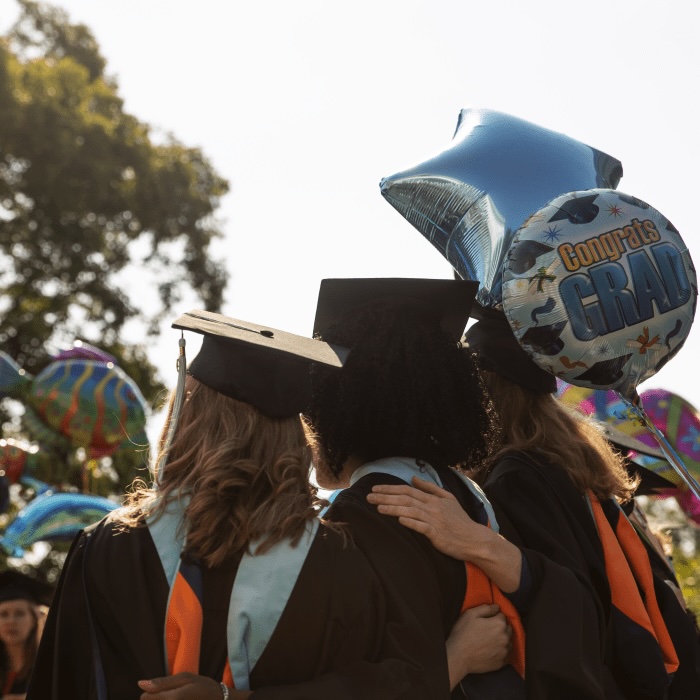Practicing Empathy During the Transition to Life After College
 Jessica Stern is a research fellow in the Department of Psychology at the University of Virginia. She is a member of the Virginia Adolescence Research Group, led by Joseph Allen, which has followed teens for more than 25 years—from adolescence through their mid-30s. She is the lead author of a new study titled “Empathy Across Three Generations: From Maternal and Peer Support in Adolescence to Adult Parenting and Child Outcomes”, which was recently published in the journal Child Development.
Jessica Stern is a research fellow in the Department of Psychology at the University of Virginia. She is a member of the Virginia Adolescence Research Group, led by Joseph Allen, which has followed teens for more than 25 years—from adolescence through their mid-30s. She is the lead author of a new study titled “Empathy Across Three Generations: From Maternal and Peer Support in Adolescence to Adult Parenting and Child Outcomes”, which was recently published in the journal Child Development.
The transition to life after college can be a pivotal moment for recent graduates. For parents—and just as importantly, friends—extending empathy and support can make all the difference for grads to succeed in their adult lives.
In a flurry of tossed caps, teary-eyed family, and cheering friends, I remember the elation of college graduation. It was a moment of joy and relief—having “made it” through the choppy waters of final exams to arrive at this other shore, buoyed by hopeful speeches and the embrace of classmates and community.
 Even more vividly, I remember the emotional crash the summer after graduation. I moved with my partner to a new state and cobbled together two part-time jobs to make rent on our first apartment, working during the day and studying for the GRE at night. Outwardly, I seemed to be adjusting reasonably well to life after college. But beneath the surface of ostensibly “having it together,” I felt deeply lonely, rudderless, and anxious about finding a path. Why had no one prepared me for how hard this would be?
Even more vividly, I remember the emotional crash the summer after graduation. I moved with my partner to a new state and cobbled together two part-time jobs to make rent on our first apartment, working during the day and studying for the GRE at night. Outwardly, I seemed to be adjusting reasonably well to life after college. But beneath the surface of ostensibly “having it together,” I felt deeply lonely, rudderless, and anxious about finding a path. Why had no one prepared me for how hard this would be?
During my time as an instructor at the University of Virginia, I’ve mentored many bright, talented, competent students through this life transition and discovered that the post-graduation struggle is not unique—in fact, it’s normal. As a developmental psychologist, I’m keenly aware of how this period of “emerging adulthood” can be a time of overwhelming change and challenge. But with the right supports, such challenge can become a crucible for immense personal and professional growth.
The truth is that the transition to life after graduation is tectonic, and recent grads often need help from friends and family to navigate their new reality. They need social connection, mentorship, and relationships they can rely on amid their newfound autonomy. They need space and grace to grieve the ending of an important chapter in their lives, assurance that they’re not alone in the struggle, plus a few trusted people with whom they can share the highs and lows of “adulting.” In a word, one of the best gifts we can give our grads is empathy.
 Our research team, led by UVA Professor Joe Allen, has followed teens for more than 25 years—from adolescence through their mid-30s. From that work, we know that young people’s first-hand experiences of empathy from parents can spark a virtuous cycle that strengthens their social abilities with peers well into adulthood. Young people who receive empathy pass it onto their close friends and future kids. They also experience stronger relationships in adulthood—a critical ingredient in long-term happiness.
Our research team, led by UVA Professor Joe Allen, has followed teens for more than 25 years—from adolescence through their mid-30s. From that work, we know that young people’s first-hand experiences of empathy from parents can spark a virtuous cycle that strengthens their social abilities with peers well into adulthood. Young people who receive empathy pass it onto their close friends and future kids. They also experience stronger relationships in adulthood—a critical ingredient in long-term happiness.
When adults meet young people’s struggles with empathy, they’re modeling the social capacities that youth themselves will need to forge meaningful and fulfilling adult relationships—with friends, romantic partners, coworkers, and, down the road, with their children.
What does empathy look like in practice? Here are a few examples.
For parents of recent college graduates, practicing empathy might mean making time for regular check-ins, being available to listen, and offering to be a sounding board for them to talk through problems, explore possible paths, and ask for help and advice. Actions can speak as loud as words: Parents and other supportive adults can demonstrate empathy by putting phones aside, staying present and engaged in the conversation, nodding, and showing interest in what the other person is saying.
 Job stress and uncertainty can be one area of conversational quicksand, as emotionally charged questions often lead to closed-off responses. Instead of asking grads the dreaded “What’s next?” parents might gain more traction by getting curious about their grad’s lived experience: How are you feeling after graduation? The job search process is so tough—I’m here if there’s anything you want to talk about. What’s it like getting to know your coworkers? What’s something you’re looking forward to this week?
Job stress and uncertainty can be one area of conversational quicksand, as emotionally charged questions often lead to closed-off responses. Instead of asking grads the dreaded “What’s next?” parents might gain more traction by getting curious about their grad’s lived experience: How are you feeling after graduation? The job search process is so tough—I’m here if there’s anything you want to talk about. What’s it like getting to know your coworkers? What’s something you’re looking forward to this week?
Practicing empathy with young adults often means carving out a wide no-judgment zone when it comes to changes and permutations in friends and romantic partners. Finding the right relationship is as hard as it’s ever been. (With the rise of online dating and remote work, it can actually be harder!) Instead of conversation stoppers—“Why are you still friends with that guy Jim?” or “When are you going to get serious about Jennifer?”—focus on curiosity about that person’s lived experience. “How has it been to connect with your friend Jim now that you’ve both graduated?” or “When did you and Jennifer realize you like spending time together? Are you thinking of doing anything together this summer?”
The challenges of finding meaningful work and relationships after college aren’t unique to Gen Z—my father experienced these challenges, too, after graduating from college and then business school in the 1970s. Living alone for the first time and feeling stuck in an unfulfilling job, he did something radical for a young man in his day: he sought therapy. In my dad’s telling of the story, his therapist’s greatest skill was empathy—and for him as a young person trying to figure out who he was, that empathy was transformative: It helped him discover what he wanted in his adult life and helped him grow into an emotionally intelligent adult. It motivated him to seek out further education and find a fulfilling career. It also gave him the relational skills to sustain a happy 40-year marriage and be a supportive father.
 In short, the power of one person who extended empathy toward my dad during a pivotal moment in his emerging adulthood helped him become a successful, joyful adult who “paid forward” this act of kindness throughout his adult life. Indeed, my dad’s willingness to share this story helped sustain and inspire me during my own transition after college.
In short, the power of one person who extended empathy toward my dad during a pivotal moment in his emerging adulthood helped him become a successful, joyful adult who “paid forward” this act of kindness throughout his adult life. Indeed, my dad’s willingness to share this story helped sustain and inspire me during my own transition after college.
Empathy isn’t just kind—it’s a gift passed through generations. We can all pass it on.
- A Revolution in the Air: The Wright Brothers Take to the Sky on December 17, 1903
- Musings on National Violin Day
- Making the Promise Real: How a UN Tax Convention Can Fulfill the UNDHR’s Vision
- UVA Club of Atlanta: Virtual Pilates Class
- UVA Club of Houston: Hoo-liday Party
- UVA Club of Fredericksburg: Hoo-liday Lights Tour